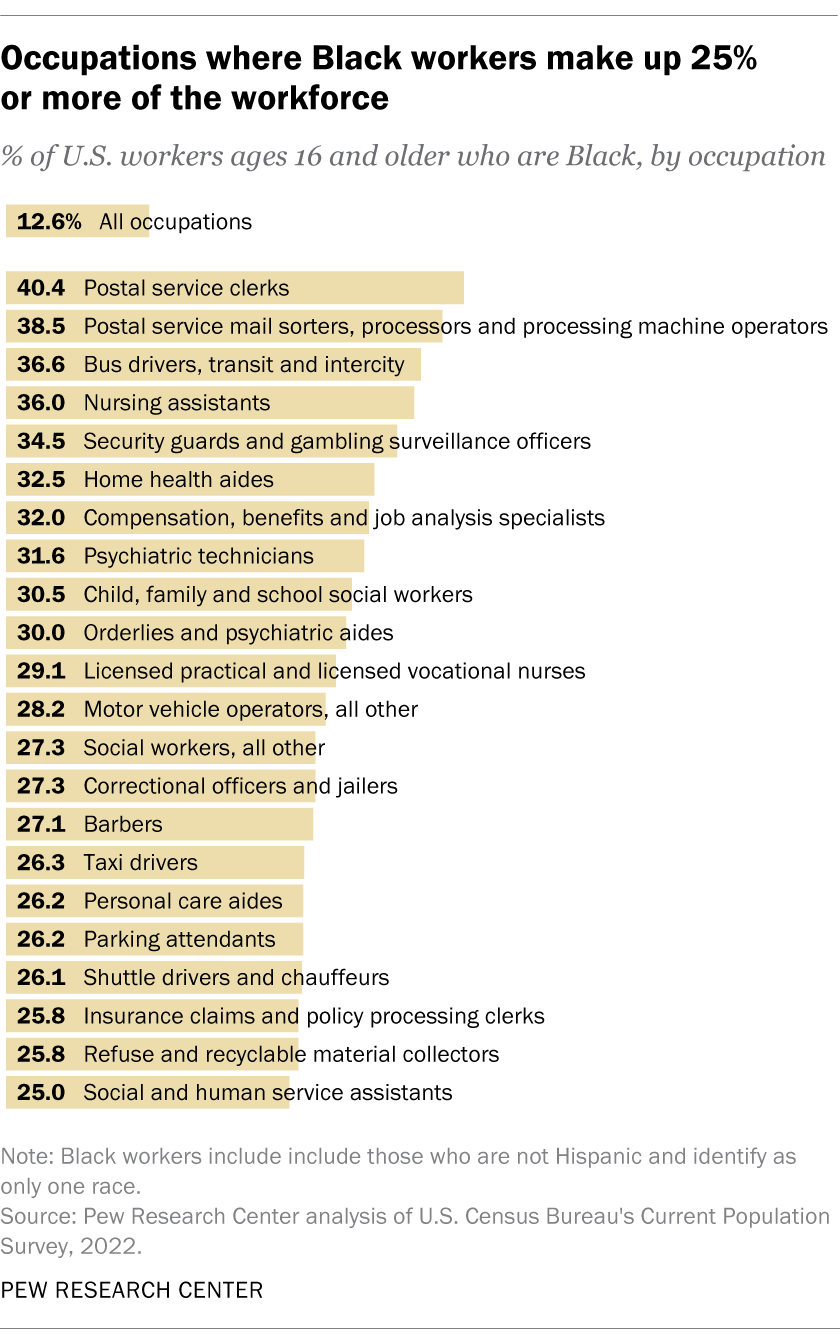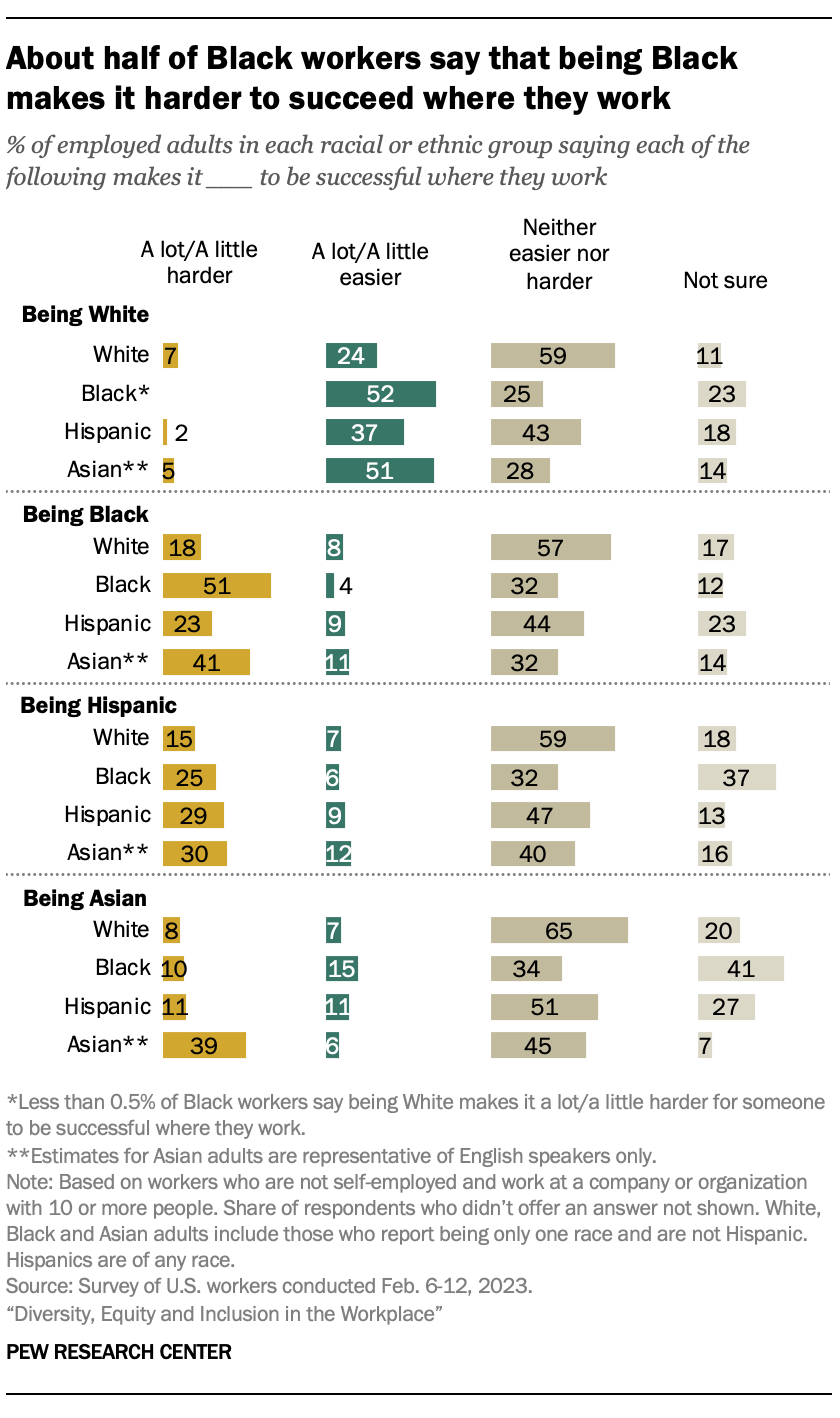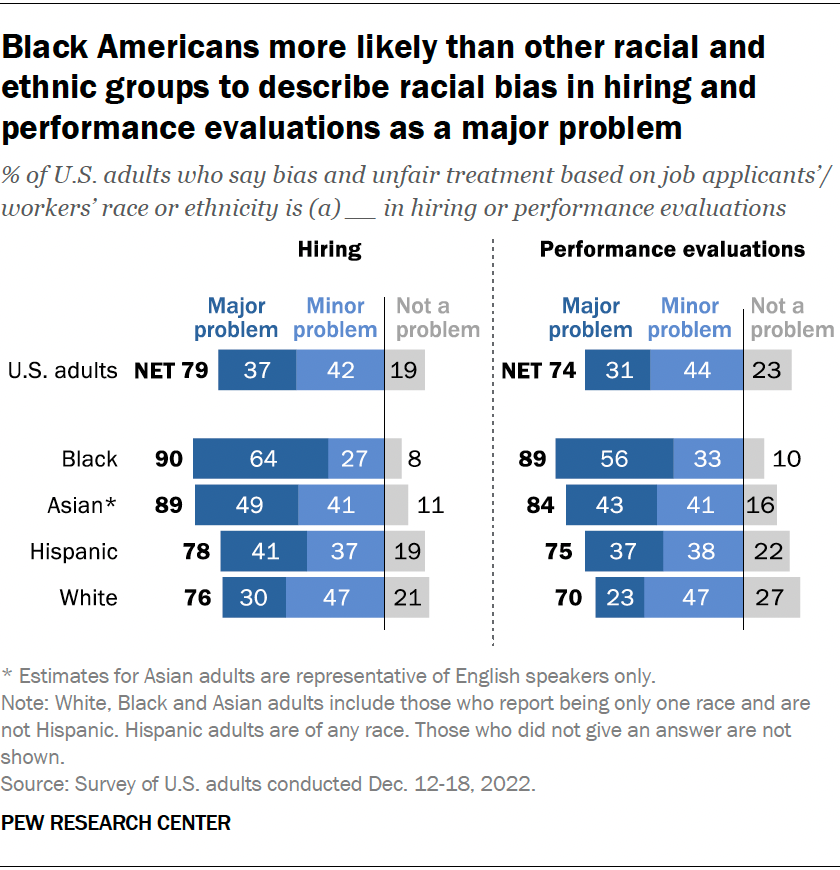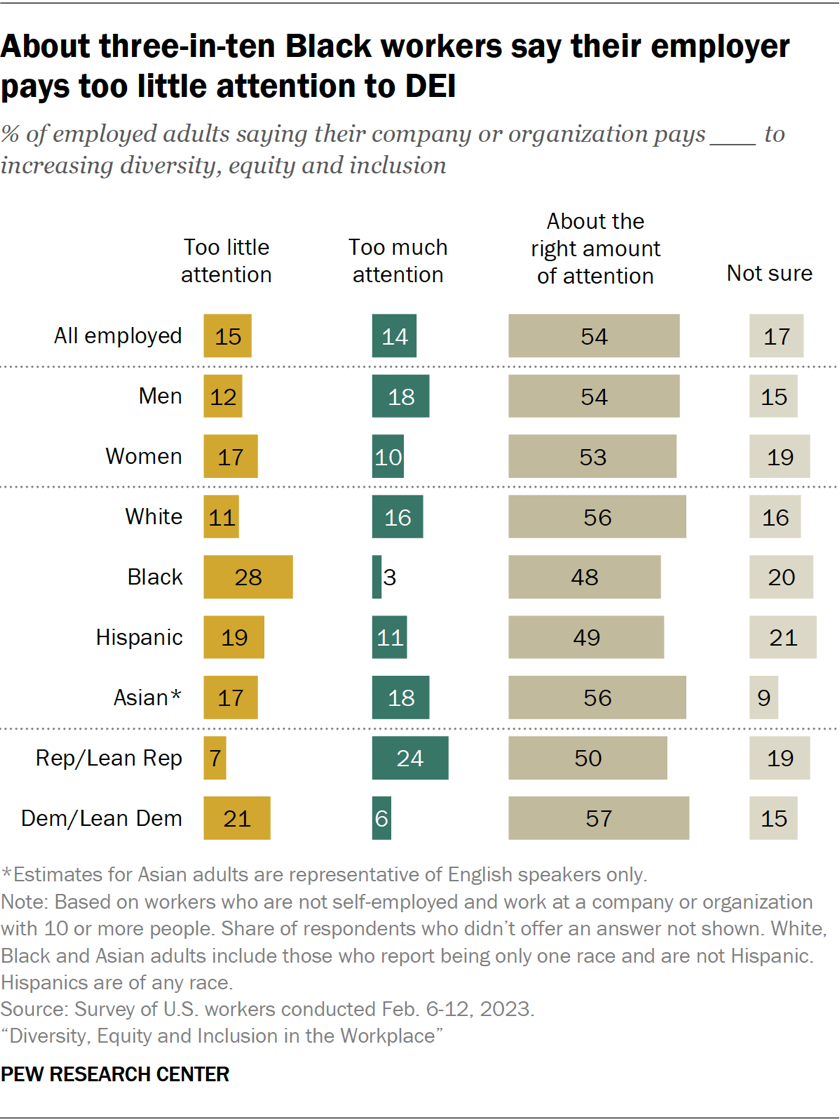

There are more than 21 million Black Americans in the U.S. labor force today. Their workforce experiences are varied but stand out from people of other races and ethnicities on several important measures: They are more likely to be employed in certain postal work, transit, health care and security fields; report experiencing more racial discrimination on the job; and place a higher value on diversity, equity and inclusion efforts in the workplace.
For Labor Day, here are facts about Black workers’ labor force experiences and attitudes, drawn from federal data sources and recent Pew Research Center surveys.
How we did thisPew Research Center conducted this analysis to understand the views and experiences of Black workers in the United States and how they differ from those of people from other racial or ethnic backgrounds. Findings are based on data from the U.S. Bureau of Labor Statistics, the U.S. Census Bureau and Center surveys. Additional information about each survey and its methodology can be found in the links in the text of this post.
In the Center surveys, references to workers or employed adults include those who are employed part time or full time; are not self-employed; have only one job or have multiple jobs but consider one their primary job; and whose company or organization has 10 or more people.
References to White, Black and Asian adults include those who are not Hispanic and identify as only one race. Hispanics are of any race. Asian American respondents include only English speakers.
Black Americans make up large shares of workers in certain transit, health and security occupations, according to Bureau of Labor Statistics (BLS) data from 2022, the most recent year available. Black workers account for about 13% of all U.S. workers, including those who work full time, part time and are self-employed. They make up especially large shares of employees in certain occupations, including postal service clerks (40.4%), transit and intercity bus drivers (36.6%), nursing assistants (36.0%), security guards and gambling surveillance officers (34.5%), and home health aides (32.5%).

Black workers make up much smaller shares of farmers, ranchers and other agricultural managers (1.5%). They also tend to be underrepresented in some science, engineering and technology occupations such as veterinarians (2.2%), mechanical engineers (3.6%) and electrical and electronics engineers (6.0%).
A 2021 Center survey found that Black adults see barriers for Black workers in STEM fields, including an unwelcoming professional environment and the need for more mentorship and representation for young people in science, technology, engineering and math.
Black workers generally earn less than U.S. workers overall, according to BLS data from 2022. Among full-time wage and salary workers, the median weekly earnings for Black workers ages 16 and older are $878, compared with $1,059 for all U.S. workers in the same age group. Among workers of other races and ethnicities in the same age group, the median weekly earnings are $823 for Hispanic workers, $1,085 for White workers and $1,401 for Asian workers. And the differences hold when accounting for education level – Black workers earn less than those in other groups even among workers with bachelor’s or advanced degrees.
Household income for Black Americans has lagged behind that for Americans of other races for several decades, according to U.S. Census Bureau data.
The unemployment rate for Black Americans is the highest of any racial or ethnic group and roughly double the rate for the U.S. overall, BLS data shows. In 2022, the unemployment rate for Americans ages 16 and older was 3.7% for men and 3.6% for women, according to BLS annual averages. Among Black Americans, the unemployment rate was 6.3% for men and 6.0% for women. This compared with around 3% each for White and Asian men and women and about 4% each for Hispanic men and women.
Monthly unemployment figures showed a record-low unemployment rate for Black Americans in April of this year, but it has begun to tick back up.
As with gaps in household income, Black Americans have experienced higher unemployment rates than their White counterparts for decades. Researchers have identified a variety of factors causing this trend, including racial discrimination and gaps in education, skills and work experience.
Black workers are the most likely to say they’ve experienced discrimination at work because of their race or ethnicity, according to a February 2023 Center survey of U.S. workers. About four-in-ten Black workers (41%) say they have experienced discrimination or been treated unfairly by an employer in hiring, pay or promotions because of their race or ethnicity. Much smaller shares of Asian (25%), Hispanic (20%) and White (8%) workers say the same.
Among Black workers, 48% of men and 36% of women say they’ve experienced discrimination or unfair treatment by an employer due to their race. There are no gender differences among White and Hispanic workers, and the sample size for Asian workers is too small to analyze men and women separately.

A quarter of U.S. workers say being Black makes it harder to succeed where they work, the February survey shows. Just 8% of U.S. workers say being Black makes it a little or a lot easier to be successful where they work, 50% say it makes it neither easier nor harder, and 17% aren’t sure.
Among Black workers, 51% say that being Black makes it harder to succeed where they work. By comparison, 41% of Asian, 23% of Hispanic and 18% of White workers view being Black as a disadvantage in their workplace. And about four-in-ten or fewer among Asian (39%), Hispanic (29%) and White (7%) workers say that being their own race or ethnicity makes it harder to be successful where they work.

Majorities of Black Americans see racial and ethnic bias as a major problem in hiring and performance evaluations generally, according to a separate Center survey of all U.S. adults conducted in December 2022. Some 64% of Black adults say that, in hiring generally, bias and unfair treatment based on job applicants’ race or ethnicity is a major problem. This compares with 49% of Asian, 41% of Hispanic and 30% of White adults who view racial and ethnic bias in hiring as a major problem.
When it comes to performance evaluations, 56% of Black adults say that, in general, racial and ethnic bias is a major problem. About four-in-ten Asian or Hispanic adults and 23% of White adults say the same.
 to describe racial bias in hiring and performance evaluations as a major problem." width="420" />
to describe racial bias in hiring and performance evaluations as a major problem." width="420" />
Black workers especially value diversity in their workplace, the February survey of workers found. Regardless of how diverse their workplace is, 53% of Black workers say it is extremely or very important to them to work somewhere with a mix of employees of different races and ethnicities. That percentage is larger than the shares of Hispanic, White and Asian workers who say this. And 42% of Black workers say they highly value a workplace with employees of different ages, compared with smaller shares of workers who are Hispanic (33%), Asian (30%) or White (24%).
There is a similar trend in views of workplace accessibility: 62% of Black workers say it is extremely or very important to them to work at a place that is accessible for people with physical disabilities, compared with 51% of Hispanic, 48% of White and 43% of Asian workers.
The vast majority of Black workers say that increasing diversity, equity and inclusion (DEI) at work is a good thing, but a sizable share give their employer low marks in this area, according to the February workers survey.

Around eight-in-ten Black workers (78%) say that focusing on increasing DEI at work is a good thing. Just 1% of Black workers say this is a bad thing, and 20% view it as neither good nor bad. While majorities of Asian (72%) and Hispanic (65%) workers also say that focusing on increasing DEI is a good thing, roughly half (47%) of White workers hold this view. In fact, 21% of White workers say it’s a bad thing.
But when it comes to their own employer’s DEI efforts, 28% of Black workers say their company or organization pays too little attention to increasing DEI – the largest share of any racial or ethnic group. Black workers are also the least likely to say that their company or organization pays too much attention to DEI. Just 3% hold this view, compared with one-in-ten or more among Hispanic (11%), White (16%) and Asian (18%) workers.